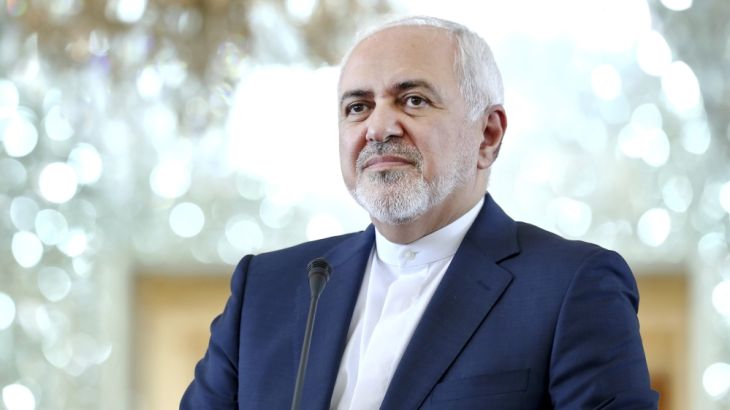
Iran’s Zarif: ‘We are not seeking war’
The Iranian foreign minister discusses his country’s nuclear programme and current tensions in the Gulf.
As the United States maintains its “maximum pressure” campaign against Iran, tension is on the rise in the Gulf, raising concerns over a full-blown military escalation.
While the US has beefed up its military presence in the region, the administration of President Donald Trump has been seeking allies for an international naval coalition to “combat Iranian aggression” in the Strait of Hormuz – one of the world’s busiest and most important shipping routes.
Keep reading
list of 4 itemsDay 1 of Donald Trump’s first criminal trial
What is Donald Trump’s ‘hush money’ trial all about?
In Trump’s New York ‘hush money’ case, prosecutors push election angle
Iran’s government meanwhile says the naval build-up could destabilise the entire region and has called for US vessels to leave the area.
“We believe that the best the US can do for the protection of maritime navigation is to just leave people alone; don’t interfere,” Iran’s Foreign Minister Mohammad Javad Zarif told Al Jazeera.
“This is basically a hostile act against Iran and I do not believe it will have any impact other than insecurity.”
He also warned against US weapons sales in the Middle East, saying, “If you are talking about threats coming from the region, the threats are coming from the US and its allies who are pouring weapons in the region, making it a tinderbox ready to blow up”.
The crisis between the two powers escalated last year when Trump pulled out of a landmark nuclear agreement signed between world powers and Iran in 2015, saying it was a bad deal. He has since reinstated sanctions targeting Tehran and countries trading with it – a move Zarif called “economic warfare”.
I think it's an important signal that the United States is getting more and more isolated - not because of anything we have done but because of what they are doing. They are violating the law, they are breaking the law ... So they are the source of instability globally and this type of behaviour will lead to further global disorder. And I think that is dangerous for everybody and everybody is realising that.
“The Americans are not in a position to draw red lines for what we do for our defence,” he says.
“I think the United States is the source of instability in this region. I think US allies, unfortunately, have been the source of instability,” he says, referring to countries including Israel and Saudi Arabia.
“What is very clear – extremely clear – is that we are not seeking war, we do not want confrontation, we want development for our people, we want development for our region,” he said.
“We need stability here, but stability should be for everybody. We cannot have stability for some and instability for others. We need to have stability for all countries in the region and we are prepared to protect stability for all countries in the region, and for those who depend on our region.”
On Iran’s continued commitment to the nuclear pact and its viability, Zarif said he believes “it is the best deal that was possible”, even though he admits that it encountered opposition.
“It wasn’t the best deal for everybody because you cannot have the perfect deal. There is no perfect deal,” he says. “And if President Trump is given correct advice, he will be able to basically accept the reality that this is the best deal possible and we can move forward.”
However, Zarif feels the deal can proceed even without US involvement, as long as the remaining participants agree to fulfil their own commitments. “What we want them to do and what we expect them to do is stay committed. And we will stay committed as long as they are,” he said.
So far, the European Union is still sticking to the deal, offering a mechanism to bypass US sanctions.
“I think it’s an important signal that the United States is getting more and more isolated – not because of anything we have done but because of what they are doing,” Zarif said.
“They are violating the law, they are breaking the law, they are breaking every international treaty they have been a member of. They have broken not only the nuclear deal with Iran, but the Paris convention, the Trans Pacific Partnership – basically everything they could break they are breaking. So they are the source of instability globally and this type of behaviour will lead to further global disorder. And I think that is dangerous for everybody and everybody is realising that.”
On Iran’s ties with its neighbours in the Gulf, Zarif said the country hopes to achieve normalisation of relations.
“What we have called for, and repeat, is that our neighbours – all of us – belong to this region, we cannot leave this region. Others will leave this region; others will not secure us; others will not provide us with the security umbrella that we need. We can provide each other with that security umbrella. We extend our hand, and our hand remains extended, to all our neighbours.”
Zarif admitted he is “certainly concerned” about the potential for a war in the region. “But as a diplomat, I always need to look for a peaceful way out. And that’s what we are trying,” he said.